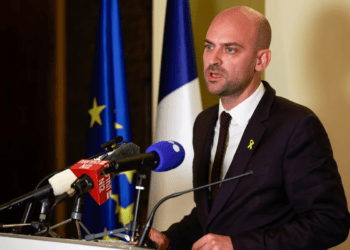Denmark’s government has announced a political agreement to ban access to social media for anyone aged under 15.
The decision, led by the Ministry of Digitalization, would set the age limit for access to social media but give some parents, after a specific assessment, the right to give consent to let their children access social media from age 13.
The agreement was officially presented at the Ministry of Digitalization by Minister of Digitalisation Caroline Stage, who negotiated the deal with the Conservatives and the Radicals.
Social media platforms will be required to implement age verification in line with the European Union’s Digital Services Act. EU guidelines issued in July allow Denmark to set a national age limit for social media use.
Left-wing parties Red Unity, SF and Alternative did not join the agreement, criticising the provision that allows parental exemptions.
The Danish Digitalization Ministry statement said the age minimum of 15 would be introduced for “certain” social media, though it did not specify which ones. Nor did the statement indicate how such a move would be enforced, in a world where millions of children have easy access to screens.
“As one of the first countries in the EU, Denmark is now taking a groundbreaking step towards introducing age limits on social media. This is done to protect children and young people in the digital world.”
Denmark’s Ministry of Digitalization
The ministry noted that a coalition of lawmakers from the political right, left and center “are making it clear that children should not be left alone in a digital world where harmful content and commercial interests are too much a part of shaping their everyday lives and childhoods.”
“Children and young people have their sleep disrupted, lose their peace and concentration, and experience increasing pressure from digital relationships where adults are not always present. This is a development that no parent, teacher or educator can stop alone.”
Denmark’s Ministry of Digitalization
According to the ministry, pressure from tech giants’ business models was “too massive,” citing a comment from Digitalization Minister Caroline Stage that through the agreement, Danish authorities were “finally drawing a line in the sand and setting a clear direction.”
The Digitalization Minister asserted that Denmark is now leading the way in Europe with a national age limit for social media and a concerted effort to strengthen the digital wellbeing of children and young people. “We are taking a necessary stand against a development where large tech platforms have had free rein in children’s rooms for far too long,” she added.
The measure would be among the most sweeping steps yet by a European government to address concerns about the use of social media among teens and younger children, which has drawn concerns in many parts of an increasingly online world.
It follows upon a move in December in Australia, where parliament enacted the world’s first ban on social media for children, setting the minimum age at 16.
That made platforms including TikTok, Facebook, Snapchat, Reddit, X and Instagram subject to fines of up to 50 million Australian dollars ($33 million) for systemic failures to prevent children younger than 16 from holding accounts.
Nonetheless, Denmark’s move is likely to stir debate well beyond Denmark’s borders.
Denmark PM Hails Move
Denmark’s Prime Minister, Mette Frederiksen said that the decision strikes a balance between regulation and family discretion. “It’s a balance between what we think we can do with regulation and legislation, and that there should be a space as a family,” she said.
The government has expressed concern over children being exposed to violent or harmful online content, which it says can affect social development. “I hope that we send a clear signal as a society that children and young people must be taken better care of,” Frederiksen said.
Frederiksen described the agreement as a first step, noting that Denmark currently has no national legislation regulating social media use. She also said the government is exploring banning phones in schools.























